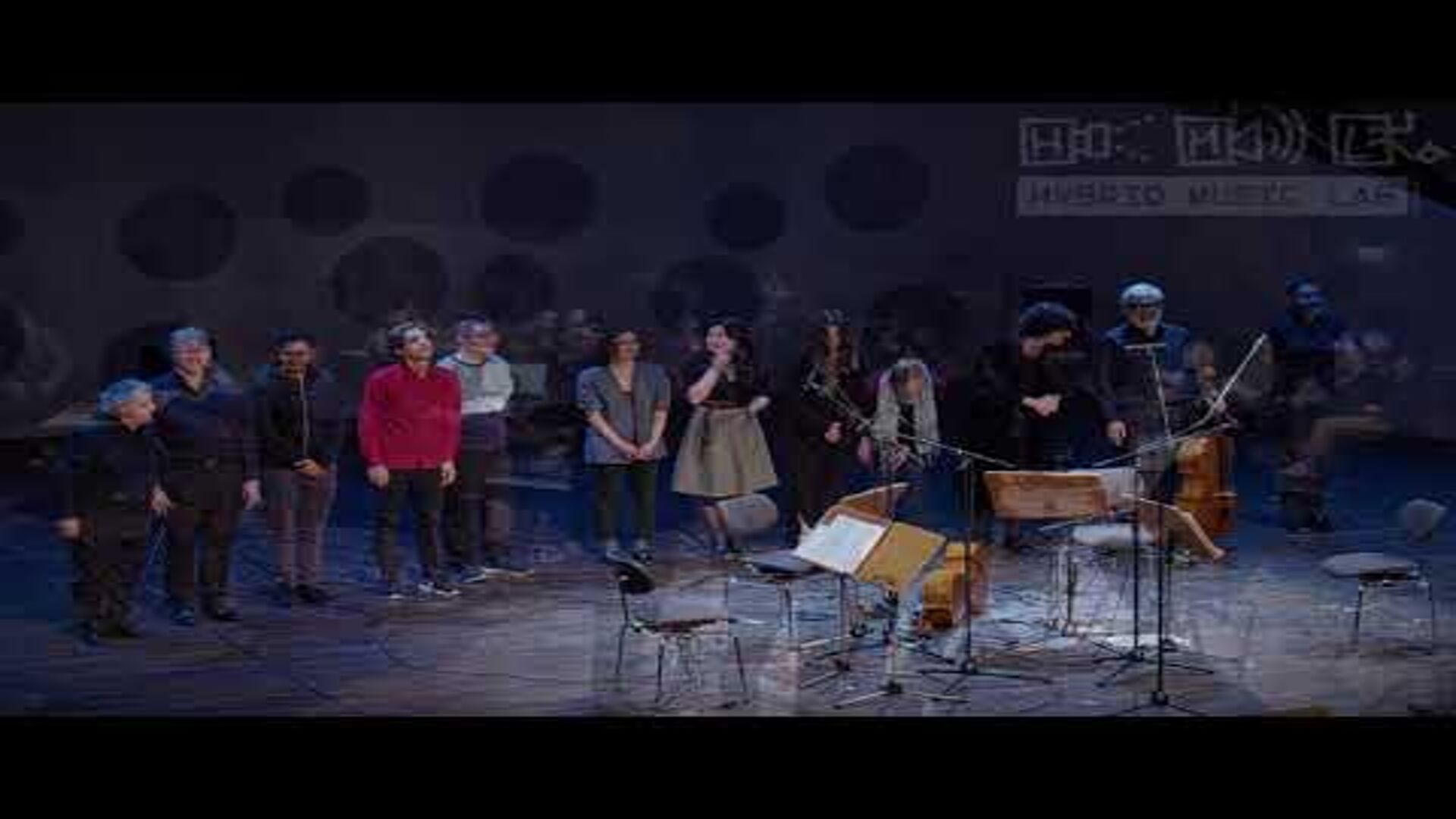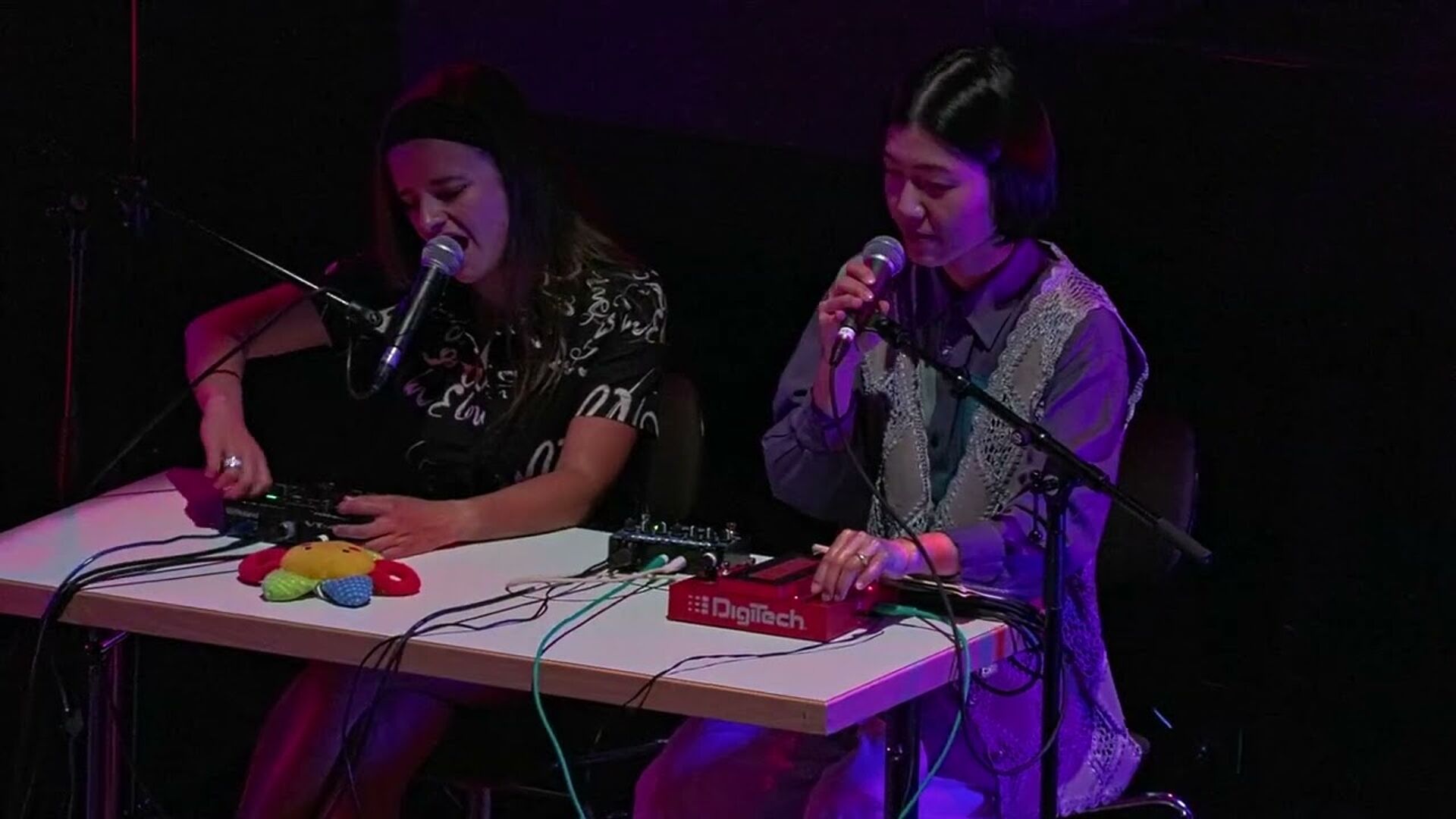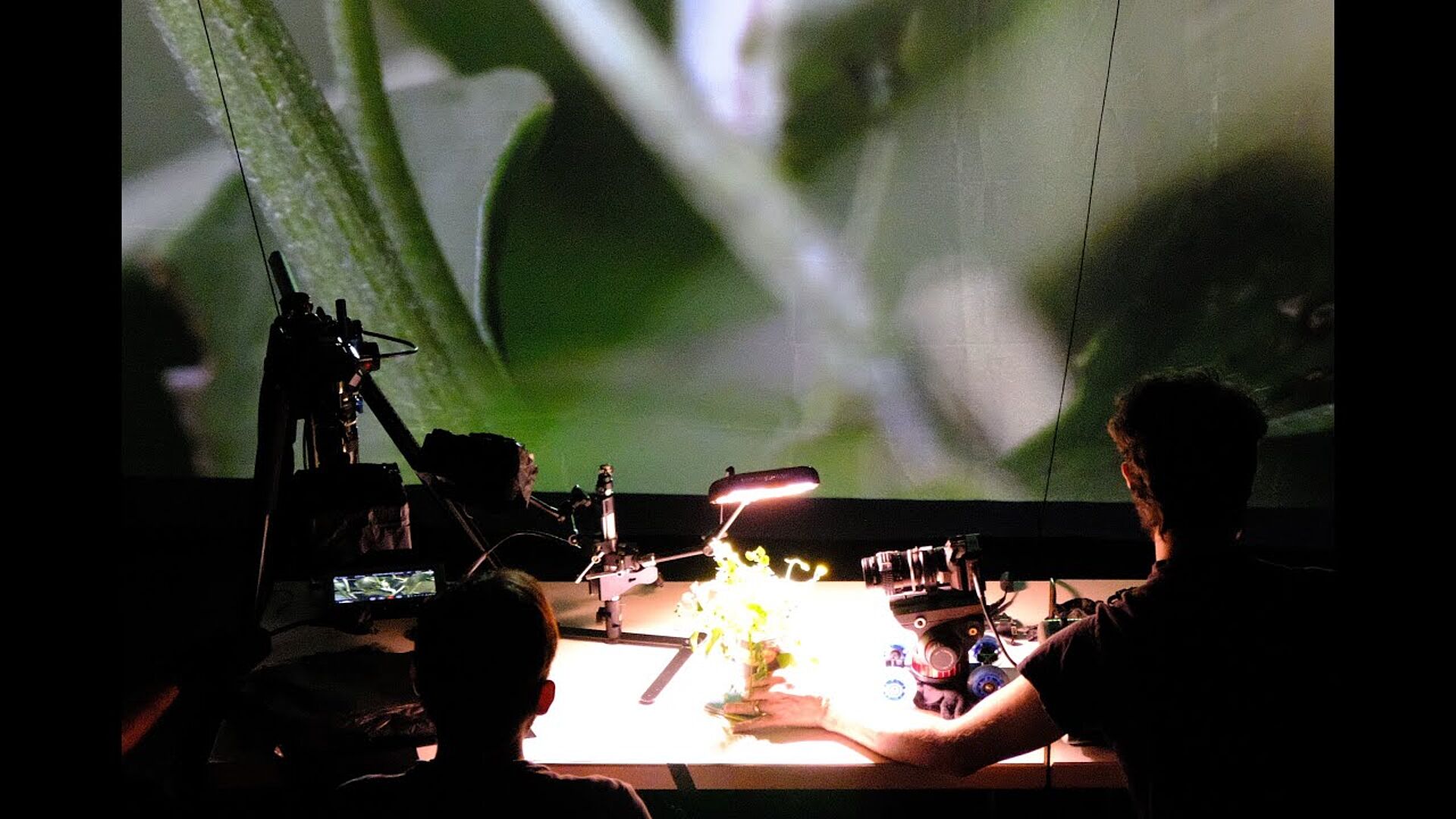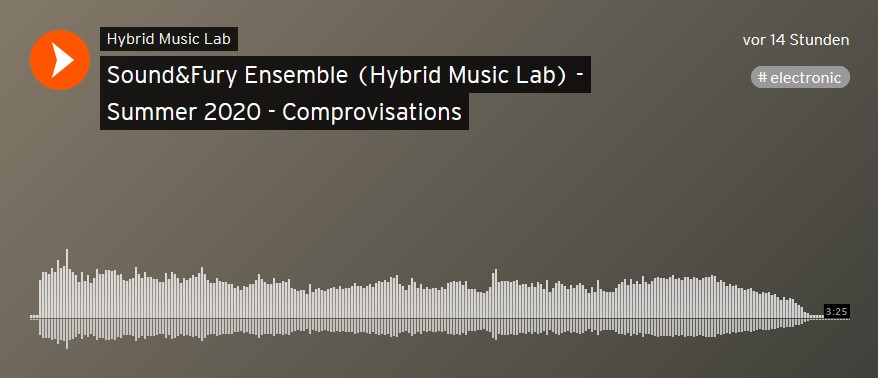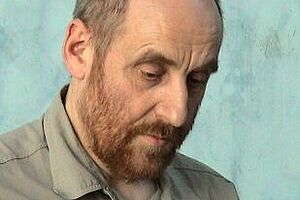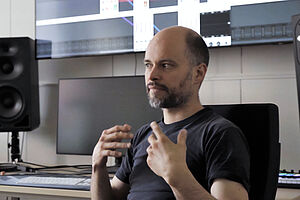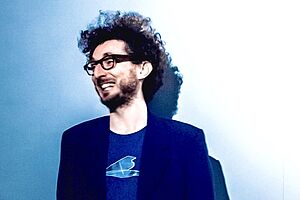Hybrid Music Lab
Together with everyday life, today’s artistic creations are becoming more and more hybrid. They make use of many media, sources and perspectives, different interactions between physical and virtual identities and are presented on different platforms. They are breaking down barriers between different disciplines and presentation models.
The Hybrid Music Lab (former Studio für Elektronische Musik) offers the surroundings, infrastructure and educational context for such musical endeavors.
Videos About us, Performances, Concerts
About Profile, Equipment and History
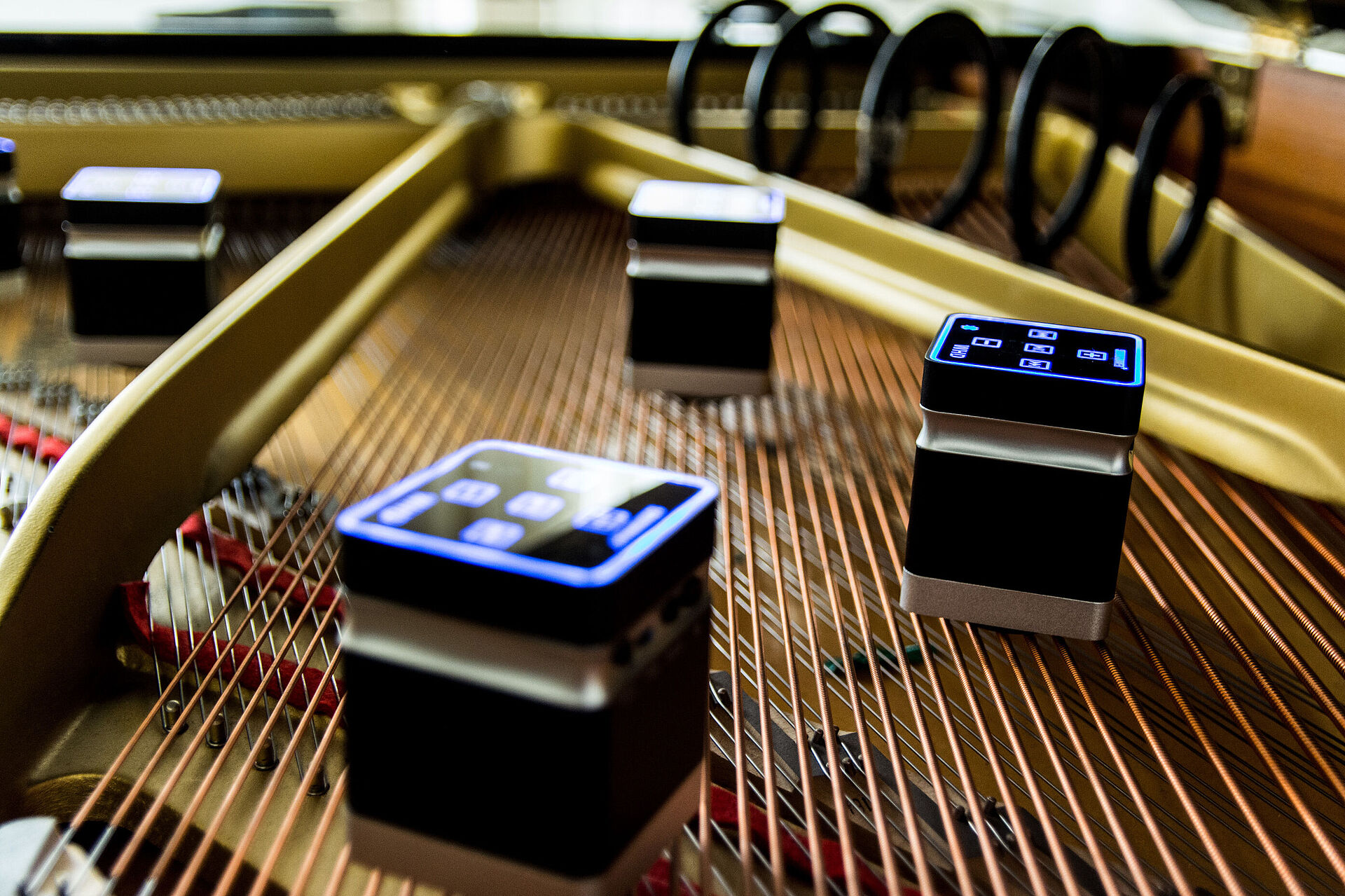
The field of expertise expertise in electronic music is an integral part of the composition studies studies at the Hochschule für Musik Dresden. With teaching hours and student time expense taken into account, this makes it one of the three most important parts of the curriculum – together with individual lessons and elective choices.
![[Translate to Englisch:] Ausstattung Studio Elektronische Musik/Foto: Christoph Mann](https://www.hfmdd.de/fileadmin/_processed_/0/1/csm_SEM-1_Christoph_Mann_9febb5f057.jpg)
The studio offers a a high quality surround monitoring system from Neumann (KH 420 and KH 310) 310) which delivers detailed audio, even for demanding projects. The equipment reflects the constantly changing modern production environment, with regular additions of novel and useful gear.
In 2020 we will be purchasing high-end video and projection gear.
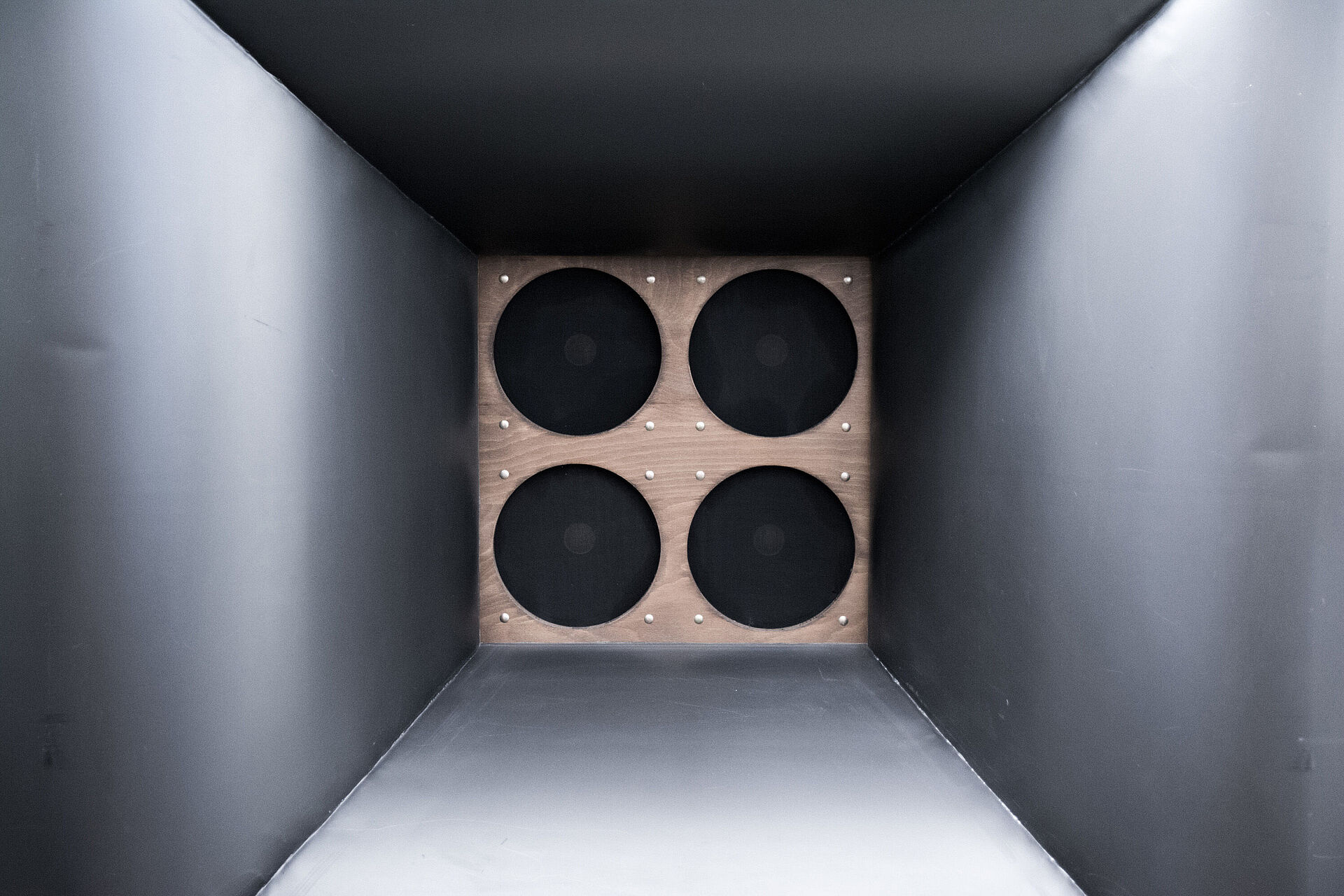
The Lab was founded by Friedbert Wissmann in 1984 as a cooperation between the Hochschule für Musik and the Technische Universität Dresden under the name „Studio für elektronische Klangerzeugung“.
During the first two years of study, 0.75 semester-week-hours (SWS) are used for technical and theoretical basics, in form of lecture or seminars. Apart from that, there is individual support throughout the first 3 years of study with 0.75 SWS one-on-one lessons, which focuses on the practical realisation of your own compositions, furthering the knowledge and understanding of the relevant technical aspects. After the first 3 years of study, work can be resumed in the Lab with subject-specific electives in the fourth year.
The Masters programme then offers the possibility to set the individual focus and related project work for electroacoustic composition and offers the possibility to realise that in the Hybrid Music Lab.
Central to the work in the Lab is the understanding of algorithmic, live-electronic as well as place- and media-specific composition techniques. Parallel to that, a tight connection with the compositorial experience of the students in the field of instrumental music is provided. The live-electronic as well as algorithmic approaches are important from the technical perspective as well as the didactic, thus effecting the work outside of the Hybrid Music Lab as well.
Throughout the course of study, the experience of handling the hardware (microphones, speakers, mixers, controller etc.) connects with the knowledge about digital signal processing and the corresponding software environments, with which the creation of your own algorithms and solutions forms an essential focus point. Working on synthesis and transformation programatically this way builds up a basis for individual experimentation.
Apart from that, the Hybrid Music Lab offers a plethora of regular theme-related projects, supports the exchange with the studios of other music colleges and universities, and offers workshops with reknown composers, programmers and performers from the field of electronic music.
History
The Lab was founded by Friedbert Wissmann in 1984 as a cooperation between the Hochschule für Musik and the Technische Universität Dresden under the name „Studio für elektronische Klangerzeugung“.
Parallel to the training with electronic keyboard instruments and computers, MIDI software was developed for Commodore C64 and Amiga.
From 1993 until 2006 Prof. Dr. Wilfried Jentzsch led the Studio für Elektronische Musik. During this time, it was aesthetically and pedagogically reoriented. Also, the technical possibilities were modernized, notably the change to Protools and Mac-based software.
In the winter semester 2002/03 the Studio was temporarily led by Lothar Voigtländer, and after that from 2006 until 2008 by Michael Flade.
From September 2008 Prof. Franz Martin Olbrisch took the position as head of the studio, until March 2020.
The studio is currently led by Stefan Prins, and renamed „Hybrid Music Lab“.
Dipl. Ing. Christoph Mann is responsible for audio/video/informatics support, tutorials and research.
Teaching Digital Music
Funded by the Stiftung für Innovation in der Hochschullehre the project "Music Teaching Digital" was set up at the Hybrid Music Lab in 2021. The aim of the project is the development of a modern curriculum for the integration of new technologies in artistic musical teaching.
Equipment-Ausleihe
Für studentische Projekte am HML sind reichhaltige Möglichkeiten zur Ausleihe von Equipment gegeben. Einen vollständigen Katalog finden Sie auf dem Onlineformular:
Sound & Fury Ensembleworkshop
Sound & Fury is a transmedial ensembleworkshop, which takes place every two weeks as a seminar with practical applications, to make music using improvisational strategies.
It‘s designed as a non-hierachical „playground“, enabling composers, performers and singers from all parts of the Hochschule (classic, jazz, pop, rock, opera,...) to come together and make intermedual music, using voice, acoustic or analogue instruments, or selfbuilt digital programs and their hybrid forms.
Plattforms Links to our Online Presence
Teaching
Below you can find a small overview of events typically taking place in the HML.
Winter Semester
-
Akustik/Instrumentenkunde: Vorlesung
Modul-CodesTuH 1 Dir (BA MU)
TuH 1 KJRP (BA MU)
TuH 1 Komp (BA MU)
WPM A/I (BA MU)
WPM A/I I (BA MU)
K Muth 1 (BA MU)RaumP 4.09 (Wettiner Platz 10)
DozentProf. Marc Andre
ZeitenSemesterWS
KommentarTermine:
-24.11.25, 13:45-18:15, Bibliothek des IMW
-25.11.25, 09:00-15:30, Bibliothek des IMW
-15.12.25, 13:45-18:15, Bibliothek des IMW
-16.12.25, 09:00-15:30, Bibliothek des IMW
-05.01.26, 13:45-18:15, Bibliothek des IMW
-06.01.26, 09:00-15:30, Bibliothek des IMW
Bitte bringen Sie einen Rechner und Ihr Instrument (soweit möglich) mit.Pflicht fürBachelor Chordirigieren
Bachelor JRP Komposition
Bachelor Komposition
Bachelor Musiktheaterkorrepetition
Bachelor Orchesterdirigieren
Bachelor MusiktheorieFachsemester1, 2
-
Projekt Musik und Digitalität: "Freie Improvisation + Elektronik" Von der Theorie zur Praxis.
Modul-CodesEM 1 - Komp (MA MU)
EM 2 - Komp (MA MU)
MuD k
PM Komp (BA MU)RaumDozentDr. Julio Zuñiga
ZeitenSemesterWS
WPF fürMaster Komposition
Bachelor Komposition -
Seminar Musik und Digitalität: Briefmarkenoper "null und eins"
Modul-CodesMuD g
RaumDozentProf. Manos Tsangaris
ZeitenSemesterWS
KommentarMenschen können zählen. aber was ist, wenn das ganze zählenkönnen sich in eine Abfolge von nur zwei ganzen Zahlen auflöst, null und eins. Sie stehen hier für off and on, weiß und schwarz, nein oder ja, das komplett binäre System, das je nach Abfolge unser Leben zu übersetzen scheint. Was erzählt uns dieses Morsealphabet, wenn man es aus seiner Versendung herauslöst und von verschiedenen Seiten aus betrachtet. Welche Lesarten sind notwendig oder möglich oder darüberhinaus.…
Probenwoche: 24.11.-02.12.2025, Aufführungen: 02.12.2025 -
Seminar Musik und Digitalität: Creation and Performance with Analog and Digital Electronics
Fr, 11:00 - 13:00Modul-CodesMuD g
RaumW 3.23 (Hybrid Music Lab)
DozentDr. Julio Zuñiga
ZeitenFr, 11:00 - 13:00 Uhr
SemesterWS
KommentarIn this course, we will look in detail at some of the different ways that composers and performing musicians working with electronics can make use of to seamlessly communicate between the physical world of gestures and the digital world of computers. An interest in working with analog and/or digital electronics is essential, though no prior experience is needed. The course is designed to offer beginners a way in to understand how to put together a composition/performance rig for the first time, while it will also deepen and develop the knowledge of students who may already have some experience in incorporating electronics into their practice. Termine: 1// 10.10. @ 11:00-13:00; 2// 24.10. @ 11:00-13:00; 3// 7.11. @ 11:00-13:00; 4// 28.11. @ 11:00-13:00 5// 12.12. @ 11:00-13:00
ANMELDUNG ERFORDERLICH BIS 6.10.25: julio.zuniga@mailbox.hfmdd.de -
Seminar Musik und Digitalität: Intro to Max
Di, 14:30 - 16:30Modul-CodesMuD g
RaumW 3.19 (Hybrid Music Lab)
DozentDr. Jason Thorpe Buchanan
ZeitenDi, 14:30 - 16:30 Uhr
SemesterWS
KommentarDieser Kurs für beide Komponisten und Interpreten bietet eine Einführung in Max, die visuelle Programmierumgebung für Musiker und Kreative. Dies ist das erste Semester eines Kurses für Studierende, die neu in der Computerprogrammierung mit Max sind und keine Vorkenntnisse in elektronischer Musik, oder Computerprogrammierung haben. Wir erlernen in Max mittlere Fertigkeiten, die zum Komponieren und Erstellen generativer Musik, interaktiver Performances sowie musikalischer oder intermedialer Kompositionen und Werkzeuge für Improvisationen oder Performances als Solist oder im Ensemble verwendet werden. Dies ist ein praxisorientierter Kurs.
Die Kursstruktur besteht aus sieben 1,75-stündigen Klassen, einschließlich Vorlesungen, Demonstrationen, und kreativen Projekten, die in einer Aufführung oder Präsentation gipfeln. Diese werden in einer Projektpräsentationen aufbereitet. Studenten mit weniger Programmiererfahrung haben die Möglichkeit, bei Bedarf an zusätzlichen Workshops teilzunehmen. Kursanforderungen: Keine.
Am 30. September um 14:30 Uhr ist das erste Treffen für Musik und Digitalität: Einführung in Max. Der Kurs wird in sieben Blöcken (immer dienstag) angeboten, mit einer abschließenden Projektpräsentation am Ende.
Alle interessierten Studenten sollten Prof. Dr. Jason Thorpe Buchanan eine E-Mail schicken: jason.buchanan@mailbox.hfmdd.de. Alle sind willkommen!
Termine: //1/ 30.9 @ 14:30-16:30 //2/ 7.10 @ 14:30-16:30 //3/ 21.10 @ 14:30-16:30 //4/ 28.10 @ 14:30-16:30 //5/ 11.11 @ 14:30-16:30 //6/ 25.11 @ 14:30-16:30 //7/ 9.12 @ 14:30-16:30
// English: This course for both composers and performers provides an introduction to Max, the visual programming environment for musicians and creatives. This is the first semester of a course for students who are new to computer programming with Max and have no prior knowledge of electronic music, or computer programming. In Max we will learn intermediate skills used to compose and create generative music, interactive performances, and musical or intermedia compositions and tools for improvisation or performance as a soloist or ensemble. This is a practice-oriented course.
The course structure consists of seven 1.75-hour classes, including lectures, demonstrations, and creative projects culminating in a performance or presentation. These will be presented in a project presentation. Students with less programming experience have the opportunity to participate in additional workshops as needed. Course Requirements: None.
On Sep 30th at 14:30 is the first meeting for Music and Digitality: Introduction to Max. The course is offered in seven blocks (always on Tuesdays), with a final project presentation at the end.
All interested students should email Prof. Dr. Jason Thorpe Buchanan at jason.buchanan@mailbox.hfmdd.de. All are welcome!
Course meetings: //1/ 30.9 @ 14:30-16:30 //2/ 7.10 @ 14:30-16:30 //3/ 21.10 @ 14:30-16:30 //4/ 28.10 @ 14:30-16:30 //5/ 11.11 @ 14:30-16:30 //6/ 25.11 @ 14:30-16:30 //7/ 9.12 @ 14:30-16:30 -
Seminar Musik und Digitalität: Recording, Mixing, Sounddesign
Mi, 10:00 - 11:00Modul-CodesWPM MuD
WPM SDRaumW 3.19 (Hybrid Music Lab)
DozentChristoph Mann
ZeitenMi, 10:00 - 11:00 Uhr
SemesterWS/SS
KommentarPraktisches Wissen über Mikrofone, Platzierung, Aufnahme von sich selbst und anderen in verschiedenen Umgebungen und Räumen. Strategien zur Bearbeitung und Abmischung. Sounddesign mit Standard-Studio-Tools, Equalizer/Filter, Kompressor, Delay-FX. Beinhaltet technisches Gehörtraining und vergleichendes Anhören von Aufnahmen. Unterrichtsbeginn 1.10.
WPF fürBachelor Gesang
Bachelor IGP Gesang
Bachelor IGP Klavier
Bachelor IGP Orchesterinstrumente/Blockflöte
Bachelor JRP Akustische Gitarre
Bachelor JRP Gesang
Bachelor JRP IGP Akustische Gitarre
Bachelor JRP IGP Gesang
Bachelor JRP IGP Instrumental
Bachelor JRP Instrumental
Bachelor JRP Komposition
Bachelor Klavier
Bachelor Musiktheaterkorrepetition
Bachelor Musiktheorie
Bachelor Orchesterdirigieren
Bachelor OrchesterinstrumenteFachsemester3, 4, 5, 6, 7, 8
-
Theorie der Elektronischen Musik 1
Do, 12:00 - 13:00Modul-CodesEM 1 - K JRP (MA MU)
EM 1 - KT (MA MU)
TuH 1 KJRP (BA MU)
WPM TEM 1 (BA MU)
TuH 1 Komp (BA MU)RaumW 3.19 (Hybrid Music Lab)
DozentChristoph Mann
ZeitenDo, 12:00 - 13:00 Uhr
SemesterWS/SS
KommentarLehrt die Produktion elektronischer Musik durch den Aufbau solider Technikkenntnisse von Grund auf. Grundlagen wie analoges und digitales Audio, Signalrouting, MIDI und andere Steuerungsprotokolle. Detaillierter Einblick in Plugins und digitale Signalverarbeitung. Alles über Synthese, spektrale Effekte, Mehrkanal, Granularsynthese. Audioprogrammierung mit MaxMSP und Max4Live. Unterrichtsbeginn 9.10.
Pflicht fürBachelor JRP Komposition
Bachelor KompositionFachsemester1, 2
-
Theorie der Elektronischen Musik 2
Mo, 11:00 - 12:30Modul-CodesEM 2 - K JRP (MA MU)
EM 2 - KT (MA MU)
TuH 2 KJRP (BA MU)
WPM TEM (BA MU)
TuH 2 Komp (BA MU)RaumW 3.19 (Hybrid Music Lab)
DozentDr. Jason Thorpe Buchanan
ZeitenMo, 11:00 - 12:30 Uhr
SemesterWS/SS
KommentarANMELDUNG ERFORDERLICH BIS 29.9.2025: jason.buchanan@mailbox.hfmdd.de
Voraussetzungen für die Teilnahme: Kenntnisse des Moduls „Theorie der elektronischen Musik (1 / Basis)“
Gemeinsam werden verschiedene Ansätze und Ästhetiken der elektronischen Musik und des medialen Komponierens erforscht, von algorithmischen Kompositionen und Intermedialität bis hin zu Improvisationen mit technischen Mitteln und allem dazwischen. Voraussetzungen für die Vergabe von Credits: Bestehen der Modulprüfung. Die Modulprüfung besteht aus wahlweise eine schriftliche Hausarbeit (5-10 Seiten) über ein Thema der elektronischen Musik oder Projektarbeit (4 Wochen), die die Programmierung einer live-elektronischen Aufgabe in einer vorgegebenen Programmumgebung umfasst.)
Termine: //1/ 29.9 @ 11:00-12:30 //2/ 6.10 @ 11:00-12:30 //3/ 20.10 @ 11:00-12:30 //4/ 27.10 @ 11:00-12:30 //5/ 10.11 @ 11:00-12:30 //6/ 24.11 @ 11:00-12:30 //7/ 8.12 @ 11:00-12:30Pflicht fürBachelor JRP Komposition
Bachelor KompositionFachsemester3, 4
Summer Semester
-
Akustik/Instrumentenkunde: Vorlesung
Modul-CodesTuH 1 Dir (BA MU)
TuH 1 KJRP (BA MU)
TuH 1 Komp (BA MU)
WPM A/I (BA MU)
WPM A/I I (BA MU)
K Muth 1 (BA MU)RaumP 4.09 (Wettiner Platz 10)
DozentProf. Marc Andre
ZeitenSemesterWS
KommentarTermine:
-24.11.25, 13:45-18:15, Bibliothek des IMW
-25.11.25, 09:00-15:30, Bibliothek des IMW
-15.12.25, 13:45-18:15, Bibliothek des IMW
-16.12.25, 09:00-15:30, Bibliothek des IMW
-05.01.26, 13:45-18:15, Bibliothek des IMW
-06.01.26, 09:00-15:30, Bibliothek des IMW
Bitte bringen Sie einen Rechner und Ihr Instrument (soweit möglich) mit.Pflicht fürBachelor Chordirigieren
Bachelor JRP Komposition
Bachelor Komposition
Bachelor Musiktheaterkorrepetition
Bachelor Orchesterdirigieren
Bachelor MusiktheorieFachsemester1, 2
-
Projekt Musik und Digitalität: "Freie Improvisation + Elektronik" Von der Theorie zur Praxis.
Modul-CodesEM 1 - Komp (MA MU)
EM 2 - Komp (MA MU)
MuD k
PM Komp (BA MU)RaumDozentDr. Julio Zuñiga
ZeitenSemesterWS
WPF fürMaster Komposition
Bachelor Komposition -
Seminar Musik und Digitalität: Briefmarkenoper "null und eins"
Modul-CodesMuD g
RaumDozentProf. Manos Tsangaris
ZeitenSemesterWS
KommentarMenschen können zählen. aber was ist, wenn das ganze zählenkönnen sich in eine Abfolge von nur zwei ganzen Zahlen auflöst, null und eins. Sie stehen hier für off and on, weiß und schwarz, nein oder ja, das komplett binäre System, das je nach Abfolge unser Leben zu übersetzen scheint. Was erzählt uns dieses Morsealphabet, wenn man es aus seiner Versendung herauslöst und von verschiedenen Seiten aus betrachtet. Welche Lesarten sind notwendig oder möglich oder darüberhinaus.…
Probenwoche: 24.11.-02.12.2025, Aufführungen: 02.12.2025 -
Seminar Musik und Digitalität: Creation and Performance with Analog and Digital Electronics
Fr, 11:00 - 13:00Modul-CodesMuD g
RaumW 3.23 (Hybrid Music Lab)
DozentDr. Julio Zuñiga
ZeitenFr, 11:00 - 13:00 Uhr
SemesterWS
KommentarIn this course, we will look in detail at some of the different ways that composers and performing musicians working with electronics can make use of to seamlessly communicate between the physical world of gestures and the digital world of computers. An interest in working with analog and/or digital electronics is essential, though no prior experience is needed. The course is designed to offer beginners a way in to understand how to put together a composition/performance rig for the first time, while it will also deepen and develop the knowledge of students who may already have some experience in incorporating electronics into their practice. Termine: 1// 10.10. @ 11:00-13:00; 2// 24.10. @ 11:00-13:00; 3// 7.11. @ 11:00-13:00; 4// 28.11. @ 11:00-13:00 5// 12.12. @ 11:00-13:00
ANMELDUNG ERFORDERLICH BIS 6.10.25: julio.zuniga@mailbox.hfmdd.de -
Seminar Musik und Digitalität: Intro to Max
Di, 14:30 - 16:30Modul-CodesMuD g
RaumW 3.19 (Hybrid Music Lab)
DozentDr. Jason Thorpe Buchanan
ZeitenDi, 14:30 - 16:30 Uhr
SemesterWS
KommentarDieser Kurs für beide Komponisten und Interpreten bietet eine Einführung in Max, die visuelle Programmierumgebung für Musiker und Kreative. Dies ist das erste Semester eines Kurses für Studierende, die neu in der Computerprogrammierung mit Max sind und keine Vorkenntnisse in elektronischer Musik, oder Computerprogrammierung haben. Wir erlernen in Max mittlere Fertigkeiten, die zum Komponieren und Erstellen generativer Musik, interaktiver Performances sowie musikalischer oder intermedialer Kompositionen und Werkzeuge für Improvisationen oder Performances als Solist oder im Ensemble verwendet werden. Dies ist ein praxisorientierter Kurs.
Die Kursstruktur besteht aus sieben 1,75-stündigen Klassen, einschließlich Vorlesungen, Demonstrationen, und kreativen Projekten, die in einer Aufführung oder Präsentation gipfeln. Diese werden in einer Projektpräsentationen aufbereitet. Studenten mit weniger Programmiererfahrung haben die Möglichkeit, bei Bedarf an zusätzlichen Workshops teilzunehmen. Kursanforderungen: Keine.
Am 30. September um 14:30 Uhr ist das erste Treffen für Musik und Digitalität: Einführung in Max. Der Kurs wird in sieben Blöcken (immer dienstag) angeboten, mit einer abschließenden Projektpräsentation am Ende.
Alle interessierten Studenten sollten Prof. Dr. Jason Thorpe Buchanan eine E-Mail schicken: jason.buchanan@mailbox.hfmdd.de. Alle sind willkommen!
Termine: //1/ 30.9 @ 14:30-16:30 //2/ 7.10 @ 14:30-16:30 //3/ 21.10 @ 14:30-16:30 //4/ 28.10 @ 14:30-16:30 //5/ 11.11 @ 14:30-16:30 //6/ 25.11 @ 14:30-16:30 //7/ 9.12 @ 14:30-16:30
// English: This course for both composers and performers provides an introduction to Max, the visual programming environment for musicians and creatives. This is the first semester of a course for students who are new to computer programming with Max and have no prior knowledge of electronic music, or computer programming. In Max we will learn intermediate skills used to compose and create generative music, interactive performances, and musical or intermedia compositions and tools for improvisation or performance as a soloist or ensemble. This is a practice-oriented course.
The course structure consists of seven 1.75-hour classes, including lectures, demonstrations, and creative projects culminating in a performance or presentation. These will be presented in a project presentation. Students with less programming experience have the opportunity to participate in additional workshops as needed. Course Requirements: None.
On Sep 30th at 14:30 is the first meeting for Music and Digitality: Introduction to Max. The course is offered in seven blocks (always on Tuesdays), with a final project presentation at the end.
All interested students should email Prof. Dr. Jason Thorpe Buchanan at jason.buchanan@mailbox.hfmdd.de. All are welcome!
Course meetings: //1/ 30.9 @ 14:30-16:30 //2/ 7.10 @ 14:30-16:30 //3/ 21.10 @ 14:30-16:30 //4/ 28.10 @ 14:30-16:30 //5/ 11.11 @ 14:30-16:30 //6/ 25.11 @ 14:30-16:30 //7/ 9.12 @ 14:30-16:30 -
Seminar Musik und Digitalität: Recording, Mixing, Sounddesign
Mi, 10:00 - 11:00Modul-CodesWPM MuD
WPM SDRaumW 3.19 (Hybrid Music Lab)
DozentChristoph Mann
ZeitenMi, 10:00 - 11:00 Uhr
SemesterWS/SS
KommentarPraktisches Wissen über Mikrofone, Platzierung, Aufnahme von sich selbst und anderen in verschiedenen Umgebungen und Räumen. Strategien zur Bearbeitung und Abmischung. Sounddesign mit Standard-Studio-Tools, Equalizer/Filter, Kompressor, Delay-FX. Beinhaltet technisches Gehörtraining und vergleichendes Anhören von Aufnahmen. Unterrichtsbeginn 1.10.
WPF fürBachelor Gesang
Bachelor IGP Gesang
Bachelor IGP Klavier
Bachelor IGP Orchesterinstrumente/Blockflöte
Bachelor JRP Akustische Gitarre
Bachelor JRP Gesang
Bachelor JRP IGP Akustische Gitarre
Bachelor JRP IGP Gesang
Bachelor JRP IGP Instrumental
Bachelor JRP Instrumental
Bachelor JRP Komposition
Bachelor Klavier
Bachelor Musiktheaterkorrepetition
Bachelor Musiktheorie
Bachelor Orchesterdirigieren
Bachelor OrchesterinstrumenteFachsemester3, 4, 5, 6, 7, 8
-
Theorie der Elektronischen Musik 1
Do, 12:00 - 13:00Modul-CodesEM 1 - K JRP (MA MU)
EM 1 - KT (MA MU)
TuH 1 KJRP (BA MU)
WPM TEM 1 (BA MU)
TuH 1 Komp (BA MU)RaumW 3.19 (Hybrid Music Lab)
DozentChristoph Mann
ZeitenDo, 12:00 - 13:00 Uhr
SemesterWS/SS
KommentarLehrt die Produktion elektronischer Musik durch den Aufbau solider Technikkenntnisse von Grund auf. Grundlagen wie analoges und digitales Audio, Signalrouting, MIDI und andere Steuerungsprotokolle. Detaillierter Einblick in Plugins und digitale Signalverarbeitung. Alles über Synthese, spektrale Effekte, Mehrkanal, Granularsynthese. Audioprogrammierung mit MaxMSP und Max4Live. Unterrichtsbeginn 9.10.
Pflicht fürBachelor JRP Komposition
Bachelor KompositionFachsemester1, 2
-
Theorie der Elektronischen Musik 2
Mo, 11:00 - 12:30Modul-CodesEM 2 - K JRP (MA MU)
EM 2 - KT (MA MU)
TuH 2 KJRP (BA MU)
WPM TEM (BA MU)
TuH 2 Komp (BA MU)RaumW 3.19 (Hybrid Music Lab)
DozentDr. Jason Thorpe Buchanan
ZeitenMo, 11:00 - 12:30 Uhr
SemesterWS/SS
KommentarANMELDUNG ERFORDERLICH BIS 29.9.2025: jason.buchanan@mailbox.hfmdd.de
Voraussetzungen für die Teilnahme: Kenntnisse des Moduls „Theorie der elektronischen Musik (1 / Basis)“
Gemeinsam werden verschiedene Ansätze und Ästhetiken der elektronischen Musik und des medialen Komponierens erforscht, von algorithmischen Kompositionen und Intermedialität bis hin zu Improvisationen mit technischen Mitteln und allem dazwischen. Voraussetzungen für die Vergabe von Credits: Bestehen der Modulprüfung. Die Modulprüfung besteht aus wahlweise eine schriftliche Hausarbeit (5-10 Seiten) über ein Thema der elektronischen Musik oder Projektarbeit (4 Wochen), die die Programmierung einer live-elektronischen Aufgabe in einer vorgegebenen Programmumgebung umfasst.)
Termine: //1/ 29.9 @ 11:00-12:30 //2/ 6.10 @ 11:00-12:30 //3/ 20.10 @ 11:00-12:30 //4/ 27.10 @ 11:00-12:30 //5/ 10.11 @ 11:00-12:30 //6/ 24.11 @ 11:00-12:30 //7/ 8.12 @ 11:00-12:30Pflicht fürBachelor JRP Komposition
Bachelor KompositionFachsemester3, 4
Contact
Christoph Mann
Stefan Prins
Prof. Dr.
Komposition
Leitung Hybrid Music Lab
Stellvertretender Studiendekan Komposition/Musiktheorie
Phone: +49 351 4923 650
Nico Juschten
Mitarbeiter Finanzen
Projekt "Musikalische Lehre Digital"
Phone: +49 351 4923 639




